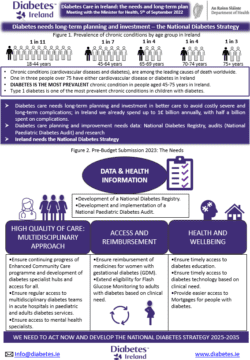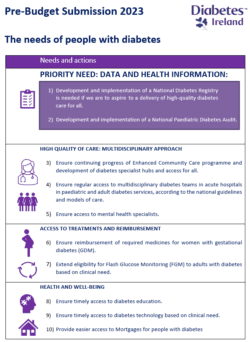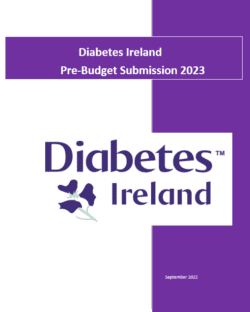Diabetes Ireland Pre-budget submission 2023 was launched and presented to the Minister for Health Stephen Donnelly on the 5th of September 2022. The document sets out the current and ongoing needs and issues facing diabetes services in Ireland, and prioritised:
- the need to provide immediate funding for the development of a National Diabetes Registry and
- regular auditing of diabetes healthcare services and clinical outcomes, so people with diabetes get access to similar standards of treatment and care regardless of where they live.
We call on the Minister and the Government to take a number of immediate actions to improve diabetes healthcare services for people with diabetes nationwide.
See the one-page summary of needs
See the Pre-Budget Submission 2023
How can you help? Take Action Today!
We also need your support. On Wednesday 21 September 2022 at 12 noon, a meeting hosted by Diabetes Ireland and the Cross Parliamentary Group on Diabetes will be held in the AV Room, Leinster House, to brief TDs and Senators on the support required to improve diabetes services nationwide.
To ensure that you are represented by your local TDs and Senators, please ask them to attend this meeting on behalf of you and all their constituents with diabetes with a view to working together to improve local diabetes services. At the meeting, people living with type 1 and type 2 diabetes, healthcare professionals and HSE clinical leads will highlight the issues and seek political support for diabetes service improvement nationwide. You can also share the summary of needs from this year’s submission.
Click and see the template of a letter to your TD
PDF letter here
See the list of TDs from your constituency
Why Pre-Budget Submission 2023?
 The Pre-budget submission provides an opportunity to highlight deficiencies in current services and the current and future needs of people with diabetes. Diabetes is a serious global public health issue which has been described by the World Health Organisation as one of the top ten most challenging health problems in the 21st century with a high individual, social and economic burden. According to the International Diabetes Federation Diabetes Atlas 2021 Ireland is ranked 7th in the world for diabetes related health expenditure per person.
The Pre-budget submission provides an opportunity to highlight deficiencies in current services and the current and future needs of people with diabetes. Diabetes is a serious global public health issue which has been described by the World Health Organisation as one of the top ten most challenging health problems in the 21st century with a high individual, social and economic burden. According to the International Diabetes Federation Diabetes Atlas 2021 Ireland is ranked 7th in the world for diabetes related health expenditure per person.
There is no accurate figure available for the number of people living with diabetes in Ireland, but based on the Scottish prevalence data and the latest census, we estimate there are now approximately 300,000 people living with diabetes in Ireland. Furthermore, recent research has identified diabetes as the most prevalent chronic condition in people between 45 to 74 years of age in Ireland further implies the necessity of having access to appropriate data and health information so better decision making and planning can be undertaken. See the relevant policy brief here.
What are the priorities?
This year, we are highlighting the need for data. Ireland was placed 20th out of 30 countries in the Euro Diabetes Index 2014 that ranks countries for the access to and quality of care and its outcomes. One of the reasons for this low score was the lack of a diabetes registry, which helps to monitor the outcomes and supports health-services planning. Since 2014 nothing has changed in this matter and Ireland is still one of the very few countries in Europe which does not have a registry or routinely undertaken annual national audits of diabetes clinical services. The lack of data and information need to be addressed as a priority in the coming budget.
To improve care in Ireland data provision is necessary and only then can appropriate interventions and decisions be made to address the multitude of issues. The entire diabetes community, including health care professionals, people living with diabetes, the HSE National Diabetes Clinical Programmes for Adults and Paediatrics and Diabetes Ireland agree that these priority needs are fundamental to generating positive change in how diabetes care is provided thus the priority ask of our Pre-Budget submission 2023 is to invest, develop and implement a National Diabetes Registry and a National Paediatric Diabetes Audit to be expanded into adult diabetes services eventually.
Other issues highlighted in our submission:
People with diabetes need access to high standards of care, expertise, treatment aligned with clinical recommendations, reimbursement of medicines to maintain good health and quality of life. The actions we are calling on the Government are person-centred, cost-effective, and easy to implement.
 Other issues in our submission include: the removal of the age restriction on the Flash Glucose Monitoring system, as Ireland is the only one Western European country with an age-restriction for this very well accepted glucose monitoring technology; the need to provide reimbursement of required medicines for women with gestational diabetes (GDM) to help protect both mother and baby, the need for extra staffing resources so people with Type 1 diabetes can get regular access to hospital diabetes services in line with national guidelines and HSE models of care. This would also improve access to timely diabetes education and diabetes technology based on clinical need.
Other issues in our submission include: the removal of the age restriction on the Flash Glucose Monitoring system, as Ireland is the only one Western European country with an age-restriction for this very well accepted glucose monitoring technology; the need to provide reimbursement of required medicines for women with gestational diabetes (GDM) to help protect both mother and baby, the need for extra staffing resources so people with Type 1 diabetes can get regular access to hospital diabetes services in line with national guidelines and HSE models of care. This would also improve access to timely diabetes education and diabetes technology based on clinical need.
The numbers of consultant endocrinologists, diabetes nurse specialists, dietitians and psychologists are low and the vast majority of clinics in Ireland are under-resourced. As outlined in the National Survey of Diabetes Care Delivery in Acute Hospitals 2018, ‘The current national WTE of consultant endocrinologists is estimated to be 72% lower than recommended minimum levels. Substantial staffing deficits were also identified across other disciplines with a national WTE percentage deficit of 95% in psychologists, a 74% deficit in dietitians, a 32% deficit in podiatrists and a 19% deficit in specialist diabetes nursing staff’. Although the situation has slightly changed since 2018, in particular in dietetics, in nursing and psychology posts the deficits still exist and are still significant.
These deficits were highlighted by the HSE National Clinical Programme for Diabetes in 2018, since then, however, staffing resources, local prevalence and needs have not been monitored or adequately addressed.
We are also concerned at the slow pace of development of the HSE Enhanced Community Care programme. Of particular concern is the employment of staff and the non-availability of appropriate accommodation for local services. We want assurances that the funding will be provided to employ the full quota of staff identified and that the service will be available free of charge upon GP referral for all people with diabetes who need it – not only to those who hold a GMS or GP Visit card. To avoid costly and unnecessary diabetes complications, investment must be made in best available diabetes care.
See the PRESS RELEASE HERE



